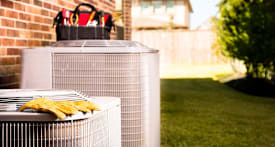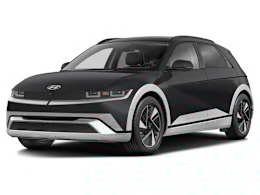The EPA has certified this vehicle as among the 20 percent lowest-emitting passenger vehicles for its model year, based on government greenhouse gas and smog ratings.
Hyundai Ioniq 5
EPA Range:
290 miles
EPA Range:
290 miles
RECALL ALERT:
There are 5 recalls on this vehicle.
Learn More.
There are 5 recalls on this vehicle.
Learn More.
Base MSRP range
$42,600 - $58,200Destination Charge: $1600
Join for Ratings and Reviews
Up to $7,500 cash back through Sep 2
RECALL ALERT:
There are 5 recalls on this vehicle.
Learn More.
There are 5 recalls on this vehicle.
Learn More.
Base MSRP range
$42,600 - $58,200Destination Charge: $1600
Join for Ratings and Reviews
Up to $7,500 cash back through Sep 2
Reliability
Predicted Reliability
/ 100
We expect the 2025 Ioniq 5 will be less reliable than the average new car. This prediction is based on data from 2022, 2023 and 2024 models.
The 2025 Hyundai Ioniq 5 has been recalled 5 times by NHTSA.
View Recalls
The 2025 Hyundai Ioniq 5 has been recalled 5 times by NHTSA.
View Recalls
New Models Predicted Reliability
This Car
0
100
0 - 100
Hyundai Ioniq 5
Hyundai Ioniq 5
vs. Similar Cars
Chevrolet Blazer ...
Chevrolet Blazer EV
Chevrolet Equinox...
Chevrolet Equinox EV
Ford Mustang Mach...
Ford Mustang Mach-E
Honda Prologue
Honda Prologue
Kia EV6
Kia EV6
Mini Countryman E...
Mini Countryman EV
Nissan Ariya
Nissan Ariya
Subaru Solterra
Subaru Solterra
Tesla Model Y
Tesla Model Y
Tesla Model Y
Tesla Model Y
Toyota bZ4X
Toyota bZ4X
Volkswagen ID4
Volkswagen ID4
Hyundai vs. Other New Car Brands Reliability
Reliability History
*
Redesign year
Overall Reliability Verdict
POTENTIAL TROUBLE SPOTS
Overall Reliability Verdict
Potential Trouble Spots
2000
2001
2002
2003
2004
2005
2006
2007
2008
2009
2010
2011
2012
2013
2014
2015
2016
2017
2018
2019
2020
2021
2022*
2023
2024
Powertrain
2000
2001
2002
2003
2004
2005
2006
2007
2008
2009
2010
2011
2012
2013
2014
2015
2016
2017
2018
2019
2020
2021
2022*
2023
2024
Electric Motor
2000
2001
2002
2003
2004
2005
2006
2007
2008
2009
2010
2011
2012
2013
2014
2015
2016
2017
2018
2019
2020
2021
2022*
2023
2024
EV Battery
2000
2001
2002
2003
2004
2005
2006
2007
2008
2009
2010
2011
2012
2013
2014
2015
2016
2017
2018
2019
2020
2021
2022*
2023
2024
EV Charging
2000
2001
2002
2003
2004
2005
2006
2007
2008
2009
2010
2011
2012
2013
2014
2015
2016
2017
2018
2019
2020
2021
2022*
2023
2024
Drive System
2000
2001
2002
2003
2004
2005
2006
2007
2008
2009
2010
2011
2012
2013
2014
2015
2016
2017
2018
2019
2020
2021
2022*
2023
2024
Show all Powertrain Trouble Spots
Suspension/Steering
2000
2001
2002
2003
2004
2005
2006
2007
2008
2009
2010
2011
2012
2013
2014
2015
2016
2017
2018
2019
2020
2021
2022*
2023
2024
Brakes
2000
2001
2002
2003
2004
2005
2006
2007
2008
2009
2010
2011
2012
2013
2014
2015
2016
2017
2018
2019
2020
2021
2022*
2023
2024
Climate System
2000
2001
2002
2003
2004
2005
2006
2007
2008
2009
2010
2011
2012
2013
2014
2015
2016
2017
2018
2019
2020
2021
2022*
2023
2024
Build Quality
2000
2001
2002
2003
2004
2005
2006
2007
2008
2009
2010
2011
2012
2013
2014
2015
2016
2017
2018
2019
2020
2021
2022*
2023
2024
Electrical Accessories
2000
2001
2002
2003
2004
2005
2006
2007
2008
2009
2010
2011
2012
2013
2014
2015
2016
2017
2018
2019
2020
2021
2022*
2023
2024
Body Hardware
2000
2001
2002
2003
2004
2005
2006
2007
2008
2009
2010
2011
2012
2013
2014
2015
2016
2017
2018
2019
2020
2021
2022*
2023
2024
Paint/Trim
2000
2001
2002
2003
2004
2005
2006
2007
2008
2009
2010
2011
2012
2013
2014
2015
2016
2017
2018
2019
2020
2021
2022*
2023
2024
Noises/Leaks
2000
2001
2002
2003
2004
2005
2006
2007
2008
2009
2010
2011
2012
2013
2014
2015
2016
2017
2018
2019
2020
2021
2022*
2023
2024
Show all Build Quality Trouble Spots
In-car Electronics
2000
2001
2002
2003
2004
2005
2006
2007
2008
2009
2010
2011
2012
2013
2014
2015
2016
2017
2018
2019
2020
2021
2022*
2023
2024
Reliability indicates how models have performed in the past, providing the basis for predicting
how the vehicles will hold up in the year ahead. These charts provide the most comprehensive
reliability information available to consumers. Based on information received from our latest
subscriber survey for over 300,000 vehicles, our reliability history charts give
you a rundown on how 2000 through 2024 vehicles are holding up in 20
potential trouble spots, ranging from the engine, transmission, electric motor, EV charging, and
brakes to power equipment and the electrical accessories.
NA indicates that we did not receive a large enough sample size to provide
data for a specific year. An X indicates that the vehicle was not manufactured for a specific year.
Recalls
PROVIDED BY


ELECTRICAL SYSTEM
Jul 23, 2025
An electrical short in the high voltage battery system increases the risk of a fire.
Summary:
Hyundai Motor America (Hyundai) is recalling certain 2025 IONIQ 5 vehicles. The high voltage battery system may contain an improperly tightened bus bar, which can cause a short-circuit.
What should you do:
Owners are advised to park their vehicles outside and away from structures until the recall remedy is complete. Dealers will inspect and repair the high voltage battery system, as necessary, free of charge. Owner notification letters are expected to be mailed September 20, 2025. Owners may contact Hyundai customer service at 1-855-371-9460. Hyundai's number for this recall is 280.
For more information:
NHTSA CAMPAIGN ID Number:
25V482000
Potential Number of Units Affected:
10
EXTERIOR LIGHTING
Jun 03, 2025
Improperly aimed headlights can result in insufficient illumination of the road, decreasing the driver's visibility and increasing the risk of a crash.
Summary:
Hyundai Motor America (Hyundai) is recalling certain 2025 Hyundai IONIQ 5 vehicles. The right-side headlight may have an incorrect headlight aim label, which can result in improperly aimed headlights. As such, these vehicles fail to comply with the requirements of Federal Motor Vehicle Safety Standard number 108, "Lamps, Reflective Devices, and Associated Equipment."
What should you do:
Hyundai will mail owners a corrected label with inspection and installation instructions. Owners may bring their vehicle to a dealer for the repair, free of charge. Owner notification letters were mailed July 15, 2025. Owners may contact Hyundai customer service at 1-855-371-9460. Hyundai's number for this recall is 279.
For more information:
NHTSA CAMPAIGN ID Number:
25V373000
Potential Number of Units Affected:
10409
SERVICE BRAKES, HYDRAULIC
Apr 10, 2025
Reduced braking performance and unexpected, continued acceleration increase the risk of a crash.
Summary:
Hyundai Motor America (Hyundai) is recalling certain 2025 Hyundai IONIQ 5 "N" vehicles equipped with left-foot braking (LFB) and N e-shift features. The integrated electronic brake (IEB) and vehicle control unit (VCU) software may cause reduced braking performance when LFB is activated. Additionally, the vehicle may continue to accelerate after the pedal is released and the vehicle's N e-shift feature is engaged.
What should you do:
Owners are advised not to use the LFB or N e-Shift features until the remedy has been performed. The IEB and VCU software will be updated over-the-air (OTA) or by a dealer, free of charge. Owner notification letters were mailed April 25, 2025. This recall replaces NHTSA recall number 25V-065. Vehicles repaired under the previous recall will need to have the new remedy completed. Owners may contact Hyundai customer service at 1-855-371-9460. Hyundai's number for this recall is 277.
For more information:
Owners may also contact the National Highway Traffic Safety Administration Vehicle Safety Hotline at 1-888-327-4236 (TTY 1- 888-275-9171) or go to www.safercar.gov.
NHTSA CAMPAIGN ID Number:
25V235000
Potential Number of Units Affected:
1589
AIR BAGS, ELECTRICAL SYSTEM
Feb 06, 2025
A rear side air bag that does not deploy as intended can increase the risk of injury in a crash.
Summary:
Hyundai Motor America (Hyundai) is recalling certain 2025 IONIQ 5 EV vehicles. The rear floor wiring harness may contain an open circuit, which can result in the rear side air bag not deploying as intended.
What should you do:
Dealers will inspect and replace the rear floor wiring harness, as necessary, free of charge. Owner notification letters were mailed March 12, 2025. Owners may contact Hyundai customer service at 1-855-371-9460. Hyundai's number for this recall is 274.
For more information:
Owners may also contact the National Highway Traffic Safety Administration Vehicle Safety Hotline at 1-888-327-4236 (TTY 1-800-424-9153) or go to nhtsa.gov.
NHTSA CAMPAIGN ID Number:
25V064000
Potential Number of Units Affected:
33
SERVICE BRAKES, HYDRAULIC
Feb 06, 2025
Reduced braking performance can increase the distance required to stop the vehicle, increasing the risk of a crash.
Summary:
Hyundai Motor America (Hyundai) is recalling certain 2025 Hyundai IONIQ 5 "N" vehicles equipped with a left-foot braking (LFB) feature. The integrated electronic brake (IEB) and vehicle control unit (VCU) software may cause reduced braking performance when LFB is activated.
What should you do:
Owners who have not received the recall remedy are advised not to use the LFB feature until the updated remedy has been performed. Additionally, owners who have received the recall remedy are advised not to use the 'N' E-shift feature until the updated remedy has been performed. Dealers will update the IEB and VCU software, free of charge. Owner notification letters were mailed March 12, 2025. This recall is replaced by NHTSA recall number 25V-235. Vehicles already repaired under this recall will need to have the new remedy completed. Owners may contact Hyundai customer service at 1-855-371-9460. Hyundai's number for this recall is 275.
For more information:
Owners may also contact the National Highway Traffic Safety Administration Vehicle Safety Hotline at 1-888-327-4236 (TTY 1-800-424-9153) or go to nhtsa.gov.
NHTSA CAMPAIGN ID Number:
25V065000
Potential Number of Units Affected:
1587
Check Vehicle for Unrepaired Recalls
Enter a valid 17-character VIN
Enter a valid 17-character VIN



















